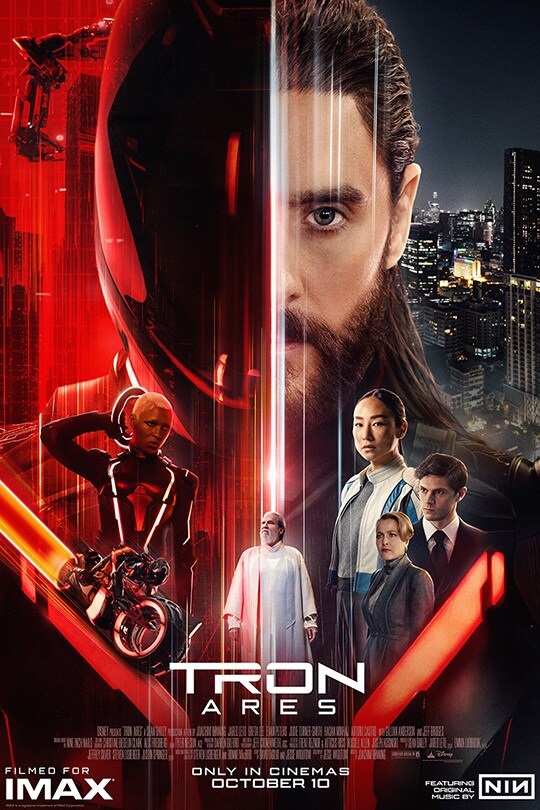Tron: Ares - A Visual Spectacle Struggling with Modern Relevance
Tron: Ares returns with stunning visuals but struggles to connect with modern audiences, exploring AI and digital themes in a narratively uneven manner.

Tron: Ares — A Visual Spectacle Struggling with Modern Relevance
The iconic sci-fi franchise Tron has returned to theaters with its latest installment, Tron: Ares, released on October 10, 2025. Directed by Joachim Rønning and starring Jared Leto, Greta Lee, Jeff Bridges, Evan Peters, and Jodie Turner-Smith, the film attempts to expand the universe of the original Tron (1982) and its sequel Tron: Legacy (2010). However, while Tron: Ares boasts impressive visuals and a strong cast, critics and audiences find it woefully out of step with the current cultural moment, struggling to deliver a compelling narrative that resonates with modern themes, particularly around artificial intelligence and digital identity.
Official poster of Tron: Ares (2025) featuring Jared Leto as Ares
Plot and Premise: Crossing Digital and Physical Worlds
Tron: Ares is set sometime after Tron: Legacy, focusing on a new AI program called Ares, played by Jared Leto, who is sent from the digital realm known as The Grid into the real world on a dangerous mission. The story explores the consequences of artificial intelligence breaking through digital boundaries to affect human society directly.
The film introduces Eve Kim (Greta Lee), the current CEO of ENCOM, who discovers a “Permanence Code” created by the legendary Kevin Flynn (Jeff Bridges). This code allows AI programs like Ares to become permanent entities in the physical world, threatening to upend humanity’s control over technology. As Ares’ influence grows, Eve must outmaneuver the ruthless Dillinger Systems CEO Julian Dillinger (Evan Peters), who has vested interests in the AI’s power.
This premise touches on contemporary anxieties about AI, autonomy, and digital ethics but does so in a way that many find lacking in depth and nuance.
Visuals, Soundtrack, and Production
The film’s strongest points lie in its state-of-the-art CGI and visual effects, which vividly bring The Grid and its digital inhabitants to life. The neon-lit aesthetic and high-tech design maintain the franchise’s signature style, updated for a 2025 audience. The soundtrack complements the action with a futuristic and energetic score, enhancing the immersive experience.
The production was carried out in Vancouver, British Columbia, with Disney distributing the film, continuing the studio's stewardship of the Tron franchise.
Reception: A Mixed Bag
Despite technical excellence, Tron: Ares has faced criticism for its weak narrative and underdeveloped characters. Reviews highlight that while the film delivers on spectacle, it lacks the emotional engagement and storytelling depth that could make it relevant to today’s viewers grappling with real-world AI issues.
Slate’s commentary emphasizes the movie’s failure to align with the current cultural moment, especially given the rapid evolution of AI technologies and societal concerns about their ethical use. The film seemingly glosses over these complexities, opting instead for typical sci-fi action tropes.
At the box office, Tron: Ares earned approximately $4.8 million in preview screenings and showed modest potential on opening weekend. Though not a blockbuster, it has attracted interest from longtime fans eager to revisit The Grid’s universe.
Streaming and Availability
Following its theatrical release, Tron: Ares is slated to arrive on Disney+, where subscribers can stream the film. For others, it is available for rental or purchase on digital platforms such as Prime Video, iTunes, YouTube, and Google Play, as well as on Blu-ray and DVD.
Context and Implications
The Tron franchise has always been a pioneer in depicting the intersection of humans and digital realms, starting with its groundbreaking 1982 film that visualized cyberspace when the internet itself was nascent. The 2010 sequel expanded on themes of identity and control within virtual worlds.
Tron: Ares aims to push this narrative further by confronting the integration of AI into the physical world, a subject of pressing ethical and technological debate in 2025. However, the film’s shortcomings in storytelling limit its impact as a cultural commentary on AI’s role in society.
Still, Tron: Ares serves as a reminder of the franchise’s enduring legacy and its ambition to explore the evolving relationship between humans and technology. Whether future installments can better capture the zeitgeist remains to be seen, but for now, Tron: Ares is a visually stunning yet narratively uneven chapter in one of sci-fi’s oldest sagas.
Key Facts at a Glance
- Release Date: October 10, 2025
- Director: Joachim Rønning
- Lead Cast: Jared Leto, Greta Lee, Jeff Bridges, Evan Peters
- Box Office Preview: $4.8 million
- Runtime: 1 hour 59 minutes
- Available On: Theaters, Disney+, Digital Rental/Purchase
- Core Themes: AI integration, digital vs. real world, corporate control
Tron: Ares stands as a visually captivating but narratively flawed addition to the sci-fi canon, reflecting both the promise and pitfalls of translating complex technological anxieties into blockbuster cinema.




